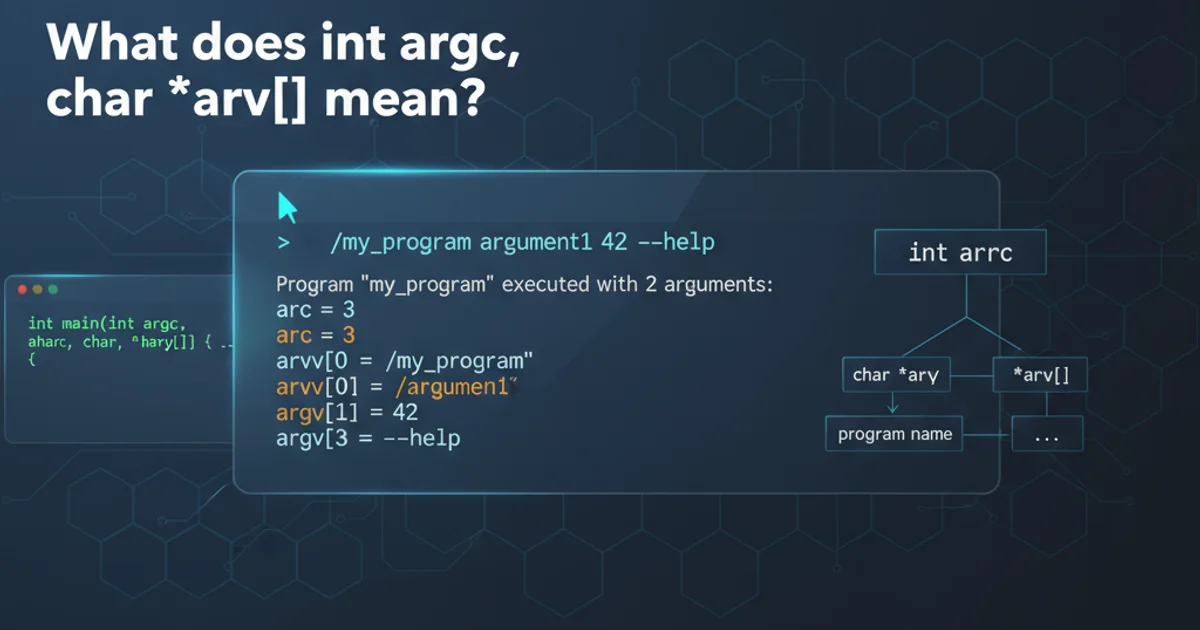What does int argc, char *argv[] mean?
Categories:
Understanding int argc, char *argv[] in C/C++

Explore the fundamental role of argc and argv in C/C++ programs for processing command-line arguments, enabling dynamic and flexible application behavior.
When you write a C or C++ program, you often want it to interact with the user or the environment. One powerful way to do this is by accepting input directly when the program is launched from the command line. This is where int argc and char *argv[] come into play. These two parameters are the standard mechanism for a main function to receive command-line arguments, allowing your programs to be more versatile and configurable without recompilation.
The Role of argc: Argument Count
The argc parameter, short for "argument count," is an integer that tells your program how many command-line arguments were passed to it. This count always includes the name of the executable itself as the first argument. So, if you run a program without any additional arguments, argc will be 1. If you provide one additional argument, argc will be 2, and so on.
#include <iostream>
int main(int argc, char *argv[]) {
std::cout << "Number of arguments: " << argc << std::endl;
return 0;
}
A simple program demonstrating the value of argc.
argc always includes the program's name. So, if you expect two user-provided arguments, you should check if argc is equal to 3.The Role of argv: Argument Values
The argv parameter, short for "argument vector," is an array of character pointers. Each pointer in this array points to a null-terminated C-style string, which represents one of the command-line arguments. The elements of argv are indexed from 0 to argc - 1:
argv[0]always points to the name of the executable program itself.argv[1]points to the first command-line argument provided by the user.argv[2]points to the second command-line argument, and so on.
It's crucial to understand that all arguments are passed as strings. If you need to use them as numbers (integers, floats, etc.), you'll need to convert them using functions like atoi, atol, strtol, atof, or strtod.
#include <iostream>
#include <string>
int main(int argc, char *argv[]) {
std::cout << "Program name: " << argv[0] << std::endl;
for (int i = 1; i < argc; ++i) {
std::cout << "Argument " << i << ": " << argv[i] << std::endl;
}
return 0;
}
Iterating through argv to print all command-line arguments.
graph TD
A[Program Execution] --> B{main(argc, argv)}
B --> C[argc: Integer count of arguments]
B --> D[argv: Array of char pointers]
D --> D0[argv[0]: Program Name]
D --> D1[argv[1]: First Argument]
D --> D2[argv[2]: Second Argument]
D --> Dn[...]
C -- "Determines size of" --> D
D0 -- "Always present" --> E[Executable Path]
D1 -- "User provided" --> F[String Value]
D2 -- "User provided" --> G[String Value]Conceptual flow of command-line argument parsing.
Practical Example: A Simple Calculator
Let's put argc and argv into practice by creating a very basic command-line calculator that adds two numbers. This example will demonstrate how to access arguments, convert them from strings to integers, and handle potential errors.
#include <iostream>
#include <cstdlib> // For atoi
int main(int argc, char *argv[]) {
if (argc != 3) {
std::cerr << "Usage: " << argv[0] << " <number1> <number2>" << std::endl;
return 1; // Indicate error
}
int num1 = std::atoi(argv[1]);
int num2 = std::atoi(argv[2]);
std::cout << "Sum: " << num1 + num2 << std::endl;
return 0;
}
A simple command-line calculator using argc and argv.
atoi function does not provide error checking for invalid input (e.g., non-numeric strings). For robust applications, consider using strtol or std::stoi (C++11 and later) which offer better error handling.To compile and run the calculator example:
g++ calculator.cpp -o calculator
./calculator 10 20
./calculator hello world
./calculator 5
This will output Sum: 30 for the first command, and an error message for the second and third, demonstrating argument validation.